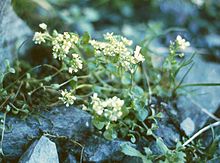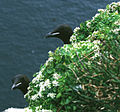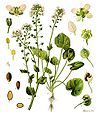- Cochlearia
-
- The unrelated Scurvy-grass Sorrel (Oxalis enneaphylla) is sometimes simply called "scurvygrass".
- For the Roman era spoons see Cochlearia (spoon)
Scurvy-grass 
Cochlearia offcinalis subsp. pyrenaica Scientific classification Kingdom: Plantae (unranked): Angiosperms (unranked): Eudicots (unranked): Rosids Order: Brassicales Family: Brassicaceae Genus: Cochlearia
L.Species About 25 species, see text
Scurvy-grass (Cochlearia species; a.k.a. Scurvy grass, Scurvygrass, or Spoonwort) is a genus of about 30 species of annual and perennial herbs in the cabbage family Brassicaceae. They are widely distributed in temperate and arctic areas of the northern hemisphere, most commonly found in coastal regions, on cliff-tops and salt marshes where their high tolerance of salt enables them to avoid competition from larger, but less salt-tolerant plants; they also occur in alpine habitats in mountains and tundra.
They form low, rounded or creeping plants, typically 5–20 cm tall. The leaves are smoothly rounded, roughly spoon-shaped (the scientific name Cochlearia derives from the Latinized form, cocleare, of the Greek κοχλιάριον, kokhliárion, a spoon; this a diminutive of κόχλος, kókhlos, seashell), or in some species, lobed; typically 1–5 cm long, and with a fleshy texture. The flowers are white with four petals and are borne in short racemes.
Contents
Selected species
About 30 species are usually accepted; several others usually treated as subspecies of C. officinalis are accepted as distinct species by some botanists.
- Cochlearia acutangula
- Cochlearia aestuaria – Estuarine Scurvy-grass
- Cochlearia alatipes
- Cochlearia anglica – English Scurvy-grass
- Cochlearia aragonensis
- Cochlearia changhuaensis
- Cochlearia cyclocarpa – Roundfruit Scurvy-grass
- Cochlearia danica – Early or Danish Scurvy-grass
- Cochlearia fenestrata – Arctic Scurvy-grass
- Cochlearia formosana
- Cochlearia fumarioides
- Cochlearia furcatopilosa
- Cochlearia glastifolia
- Cochlearia groenlandica – Greenland Scurvy-grass
- Cochlearia henryi
- Cochlearia hui
- Cochlearia lichuanensis
- Cochlearia longistyla
- Cochlearia megalosperma
- Cochlearia microcarpa
- Cochlearia oblongifolia – East Asian Scurvy-grass
- Cochlearia officinalis – Common Scurvy-grass (including C. excelsa, C. pyrenaica, C. scotica)
- Cochlearia paradoxa
- Cochlearia rivulorum
- Cochlearia rupicola
- Cochlearia sessilifolia – Sessile-leaved or Alaskan Scurvy-grass
- Cochlearia sinuata
- Cochlearia tatrae
- Cochlearia tridactylites – Three-fingered Scurvy-grass
- Cochlearia warburgii
Two species formerly included in the genus Cochlearia are now usually treated in separate genera:
- Horseradish Armoracia rusticana (previously Cochlearia armoracia)
- Wasabi Wasabia japonica (previously Cochlearia wasabi)
Cook's scurvy grass, Lepidium oleraceum, was used by James Cook to prevent scurvy, but is now almost extinct.[1]
Uses
Scurvy-grass was extensively eaten in the past by sailors suffering from scurvy after returning from long voyages, as the leaves are rich in vitamin C, which cures this deficiency disease resulting from a lack of fresh vegetables in the diet. The leaves, which have a strong peppery taste similar to the related horseradish and watercress, are also sometimes used in salads.
Scurvy-grass Sorrel (Oxalis enneaphylla) is an unrelated plant from southern South America and the Falkland Islands that was also used to treat scurvy.
Scurvy-grass and roads
The advent of modern fast roads treated with salt in winter for ice clearance has resulted in the colonisation by scurvy-grass of many inland areas where it formerly did not occur. The scurvy-grass seeds become trapped on car wheels, transported often for a considerable distance, and then washed off, to grow in the salt-rich soil at the side of the road where other plants cannot survive. For the rapid colonisation of a British inland county between 1989–2002, see Cochlearia danica in Worcestershire.
-
Cochlearia offcinalis on Bear Island, Norway
References
Further reading
- (1990). "Morphology and taxonomy of the genus Cochlearia (Brassicaceae) in Northern Scandinavia". doi:10.1111/j.1756-1051.1990.tb01769.x
Wikimedia Foundation. 2010.


